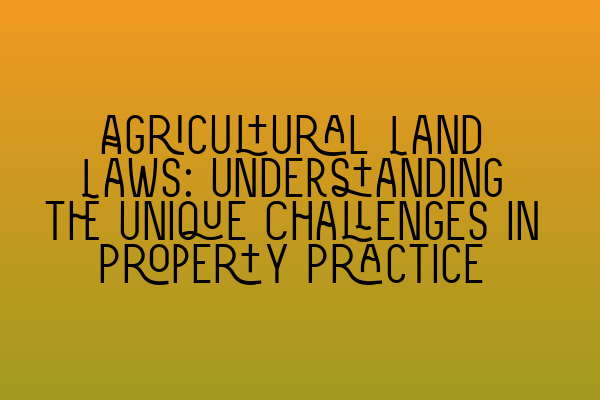As a solicitor practicing property law, it is crucial to have a deep understanding of various laws and regulations that govern different types of land. One particular area that requires specialized knowledge and attention is agricultural land laws. The unique challenges presented by agricultural land can significantly impact property practice. In this blog post, we will delve into the complexities of agricultural land laws and explore the key considerations for property practitioners.
Agricultural land, also known as farmland, is an invaluable resource that plays a vital role in sustaining the agricultural industry and ensuring food security. Unlike other types of land, agricultural land is subject to specific legal frameworks aimed at facilitating sustainable farming practices and protecting the rural economy. These laws cover a wide range of issues, including land use, tenancy arrangements, environmental regulations, subsidies, and property rights.
Understanding the unique challenges posed by agricultural land laws is crucial for property practitioners who advise clients on matters related to farmland. Whether you are involved in conveyancing, landlord and tenant matters, or agricultural development projects, having a solid grasp of these laws will enable you to provide valuable guidance and ensure compliance with the regulatory framework.
One of the fundamental considerations when dealing with agricultural land is the classification of the land for agricultural use. In some jurisdictions, land may be categorized as agricultural land, and specific planning permissions or restrictions may apply to any change in land use. Knowing the requirements and limitations associated with converting agricultural land for other purposes is essential to avoid legal disputes and potential delays in property transactions.
Another key aspect of agricultural land law is agricultural tenancy law. Agricultural tenancies are governed by their own unique set of rules, particularly through the legislation addressing agricultural holdings or farm business tenancies. Understanding the intricacies of these laws is vital for property practitioners when producing tenancy agreements, advising on rent reviews, or handling disputes between landlords and tenants.
Environmental regulations also play a significant role in agricultural land law. Farmers and landowners are subject to various environmental obligations aimed at protecting sensitive habitats, promoting sustainable farming practices, and mitigating environmental risks. Familiarizing yourself with relevant environmental legislation ensures that you can provide accurate advice on compliance requirements and potential liabilities associated with agricultural land.
Moreover, property practitioners involved in agricultural land transactions must be aware of the specific tax considerations related to farmland. In some jurisdictions, agricultural land may qualify for tax relief or exemptions, such as agricultural property relief or business property relief. Understanding these tax provisions and their applicability to different scenarios is crucial for advising clients on tax-efficient land management and succession planning.
Navigating the complexities of agricultural land laws requires a comprehensive approach that integrates legal expertise with an understanding of the agricultural industry and its unique challenges. As property practitioners, it is essential to stay updated on the latest developments in agricultural legislation and case law to provide the best possible advice to clients.
At SQE Property Law & Land Law, we recognize the importance of specialized knowledge in agricultural land laws. Our team of expert solicitors is well-versed in the intricacies of property practice, including the complexities of agricultural land. Whether you require assistance with agricultural conveyancing, tenancy agreements, or navigating environmental regulations, we have the expertise and experience to guide you through the process effectively.
To further enhance your understanding of property law and land law, we offer a range of SQE preparation courses. These courses are designed to equip aspiring solicitors with the necessary knowledge and skills for success in the Solicitors Qualifying Examination (SQE). With a comprehensive curriculum that covers all aspects of property law, including agricultural land, our courses will ensure you are well-prepared for the examination.
If you are ready to take your career as a property practitioner to the next level, get in touch with us today to learn more about our SQE preparation courses and how they can help you achieve your professional goals. For upcoming SQE exam dates and registration information, please visit our website.
Being well-versed in agricultural land laws is essential for property practitioners, and it can significantly impact the success of your legal practice. By staying informed, seeking professional development, and leveraging the expertise of specialist solicitors, you can effectively navigate the unique challenges presented by agricultural land and provide valuable advice to your clients.
